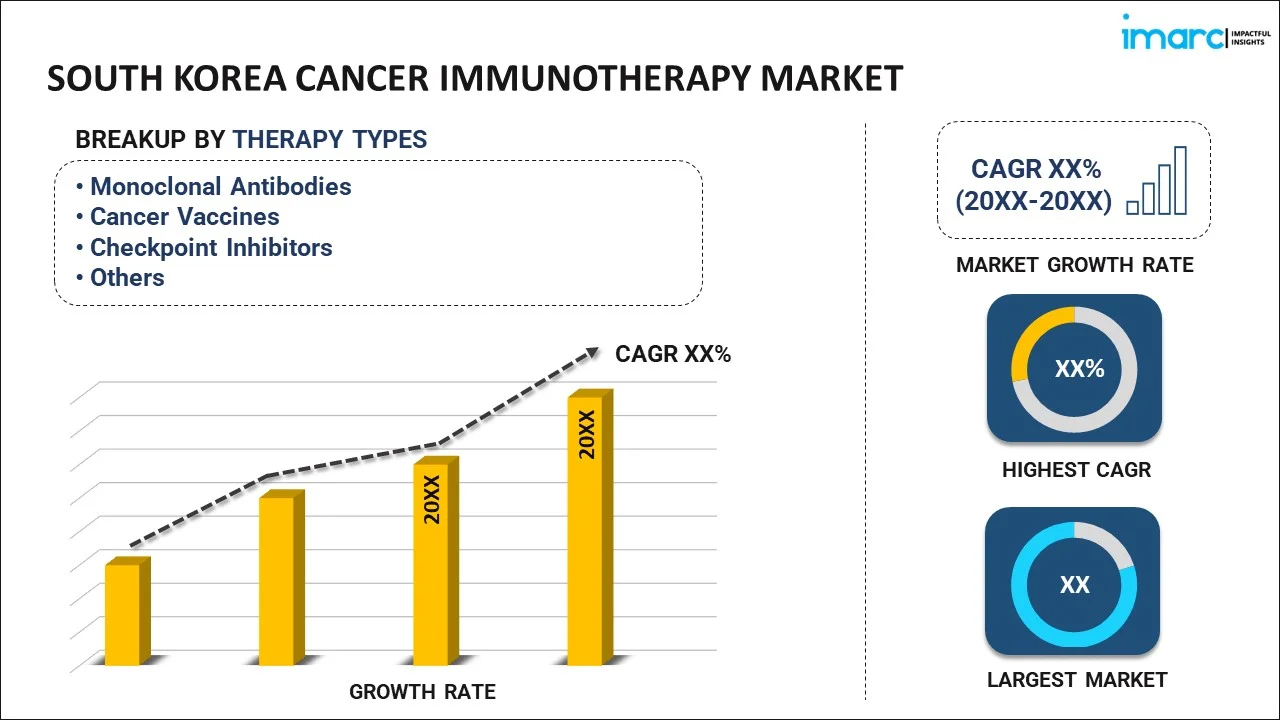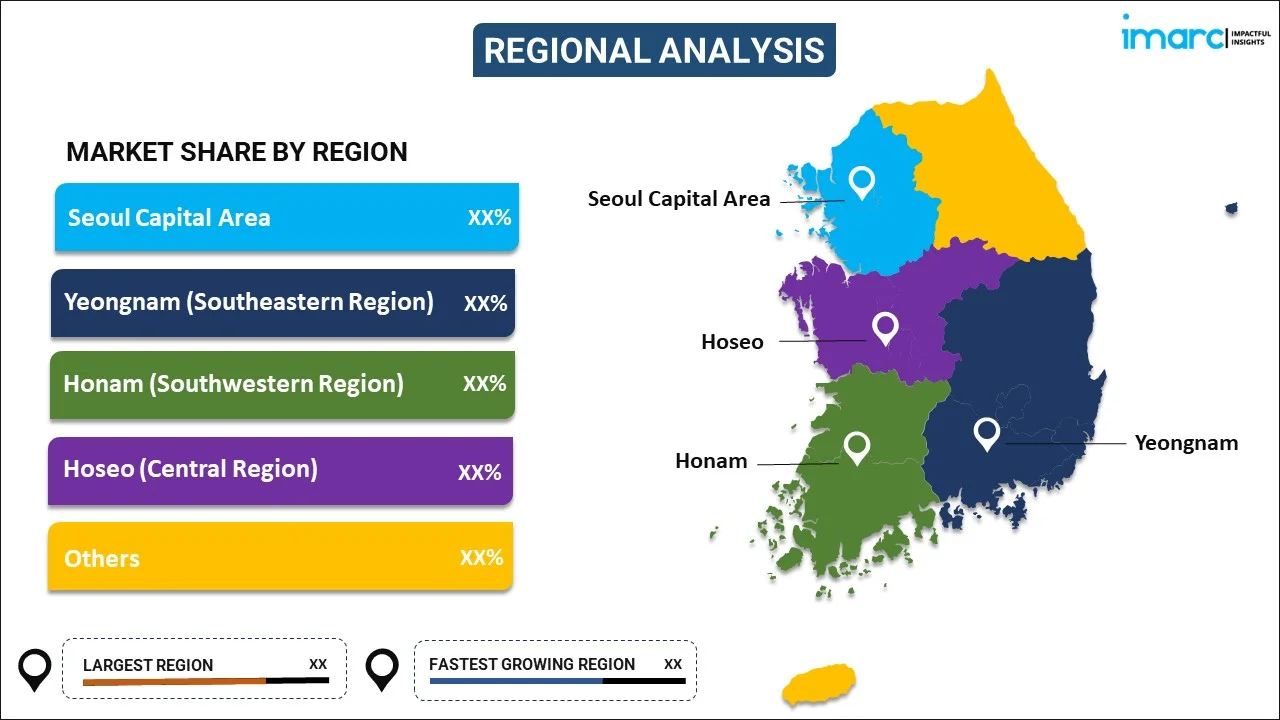
South Korea Cancer Immunotherapy Market Report by Therapy Type (Monoclonal Antibodies, Cancer Vaccines, Checkpoint Inhibitors, Immunomodulators, and Others), Application (Lung Cancer, Breast Cancer, Colorectal Cancer, Melanoma, Prostate Cancer, Head and Neck Cancer, and Others), End User (Hospitals, Cancer Research Centers, Clinics, and Others), and Region 2025-2033
Market Overview:
South Korea cancer immunotherapy market size is projected to exhibit a growth rate (CAGR) of 7.89% during 2025-2033. The growing scientific breakthroughs in understanding the complexities of the immune system, rising prevalence of cancer cases among the masses due to the adoption of unhealthy lifestyle, and increasing identification of specific biomarkers represent some of the key factors driving the market.
|
Report Attribute
|
Key Statistics
|
|---|---|
|
Base Year
|
2024 |
|
Forecast Years
|
2025-2033 |
|
Historical Years
|
2019-2024
|
| Market Growth Rate (2025-2033) | 7.89% |
Cancer immunotherapy, also known as immuno-oncology, is a comprehensive approach to treating cancer that harnesses the immune system of the body to recognize, attack, and eliminate cancer cells. It involves various checkpoint inhibitors, which target specific proteins in immune cells or cancer cells, unleashing the immune system to identify and kill malignant cells more effectively. It also includes CAR-T cell therapy, which is a personalized approach where the immune cells (T cells) of the patient are genetically modified to express chimeric antigen receptors (CARs). It can be preventive, targeting viruses that can lead to cancer, or therapeutic, enhancing the immune response against existing cancer cells. It encompasses monoclonal antibodies, which are laboratory-made molecules that can mimic the ability of the immune system to fight off harmful pathogens. Cancer immunotherapy offers a more precise and targeted approach compared to traditional treatments. It has demonstrated unprecedented success in treating cancers that were once considered incurable. It offers reduced toxicity, which translates into an improved quality of life for patients taking treatment. It has shown remarkable efficacy in treating cancers that have proven resistant to conventional therapies, providing a promising avenue for patients facing limited treatment options.
South Korea Cancer Immunotherapy Market Trends:
At present, increasing scientific breakthroughs in understanding the complexities of the immune system and its interactions with cancer represent one of the crucial factors impelling the growth of the market in South Korea. These advancements are significantly expanding the therapeutic arsenal against various malignancies, providing clinicians with powerful tools to help the immune system in the fight against cancer. Besides this, the rising prevalence of cancer among the masses due to the adoption of unhealthy lifestyles, excessive smoking, and consumption of alcohol daily is contributing to the growth of the market in the country. In addition, the exploration of personalized medicine and biomarkers is emerging as a prominent trend, enabling a more precise and tailored approach to cancer immunotherapy. The identification of specific biomarkers helps in predicting patient responses and selecting individuals who are most likely to benefit from immunotherapeutic interventions. This personalized approach not only enhances treatment efficacy but also minimizes adverse effects, contributing to the overall acceptance and adoption of immunotherapy across diverse cancer types. Apart from this, regulatory agencies in the country are showing a commitment to expediting the approval processes for novel immunotherapies, recognizing their potential to address unmet medical needs. Fast-track designations, breakthrough therapy designations, and accelerated approval pathways are becoming integral components of regulatory frameworks, facilitating a more streamlined and rapid route to market for promising immunotherapeutic agents. Additionally, numerous healthcare systems are adapting reimbursement strategies to accommodate the unique characteristics of immunotherapies, acknowledging their long-term benefits and cost-effectiveness.
South Korea Cancer Immunotherapy Market Segmentation:
IMARC Group provides an analysis of the key trends in each segment of the market, along with forecasts at the country levels for 2025-2033. Our report has categorized the market based on therapy type, application, and end user.
Therapy Type Insights:

- Monoclonal Antibodies
- Cancer Vaccines
- Checkpoint Inhibitors
- Immunomodulators
- Others
The report has provided a detailed breakup and analysis of the market based on the therapy type. This includes monoclonal antibodies, cancer vaccines, checkpoint inhibitors, immunomodulators, and others.
Application Insights:
- Lung Cancer
- Breast Cancer
- Colorectal Cancer
- Melanoma
- Prostate Cancer
- Head and Neck Cancer
- Others
A detailed breakup and analysis of the market based on the application have also been provided in the report. This includes lung cancer, breast cancer, colorectal cancer, melanoma, prostate cancer, head and neck cancer, and others.
End User Insights:
- Hospitals
- Cancer Research Centers
- Clinics
- Others
The report has provided a detailed breakup and analysis of the market based on the end user. This includes hospitals, cancer research centers, clinics, and others.
Regional Insights:

- Seoul Capital Area
- Yeongnam (Southeastern Region)
- Honam (Southwestern Region)
- Hoseo (Central Region)
- Others
The report has also provided a comprehensive analysis of all the major regional markets, which include Seoul Capital Area, Yeongnam (Southeastern Region), Honam (Southwestern Region), Hoseo (Central Region), and others.
Competitive Landscape:
The market research report has also provided a comprehensive analysis of the competitive landscape in the market. Competitive analysis such as market structure, key player positioning, top winning strategies, competitive dashboard, and company evaluation quadrant has been covered in the report. Also, detailed profiles of all major companies have been provided.
South Korea Cancer Immunotherapy Market Report Coverage:
| Report Features | Details |
|---|---|
| Base Year of the Analysis | 2024 |
| Historical Period | 2019-2024 |
| Forecast Period | 2025-2033 |
| Units | Million USD |
| Scope of the Report | Exploration of Historical Trends and Market Outlook, Industry Catalysts and Challenges, Segment-Wise Historical and Future Market Assessment:
|
| Therapy Types Covered | Monoclonal Antibodies, Cancer Vaccines, Checkpoint Inhibitors, Immunomodulators, Others |
| Applications Covered | Lung Cancer, Breast Cancer, Colorectal Cancer, Melanoma, Prostate Cancer, Head and Neck Cancer, Others |
| End Users Covered | Hospitals, Cancer Research Centers, Clinics, Others |
| Regions Covered | Seoul Capital Area, Yeongnam (Southeastern Region), Honam (Southwestern Region), Hoseo (Central Region), Others |
| Customization Scope | 10% Free Customization |
| Post-Sale Analyst Support | 10-12 Weeks |
| Delivery Format | PDF and Excel through Email (We can also provide the editable version of the report in PPT/Word format on special request) |
Key Questions Answered in This Report:
- How has the South Korea cancer immunotherapy market performed so far and how will it perform in the coming years?
- What has been the impact of COVID-19 on the South Korea cancer immunotherapy market?
- What is the breakup of the South Korea cancer immunotherapy market on the basis of therapy type?
- What is the breakup of the South Korea cancer immunotherapy market on the basis of application?
- What is the breakup of the South Korea cancer immunotherapy market on the basis of end user?
- What are the various stages in the value chain of the South Korea cancer immunotherapy market?
- What are the key driving factors and challenges in the South Korea cancer immunotherapy?
- What is the structure of the South Korea cancer immunotherapy market and who are the key players?
- What is the degree of competition in the South Korea cancer immunotherapy market?
Key Benefits for Stakeholders:
- IMARC’s industry report offers a comprehensive quantitative analysis of various market segments, historical and current market trends, market forecasts, and dynamics of the South Korea cancer immunotherapy market from 2019-2033.
- The research report provides the latest information on the market drivers, challenges, and opportunities in the South Korea cancer immunotherapy market.
- Porter's five forces analysis assist stakeholders in assessing the impact of new entrants, competitive rivalry, supplier power, buyer power, and the threat of substitution. It helps stakeholders to analyze the level of competition within the South Korea cancer immunotherapy industry and its attractiveness.
- Competitive landscape allows stakeholders to understand their competitive environment and provides an insight into the current positions of key players in the market.
Need more help?
- Speak to our experienced analysts for insights on the current market scenarios.
- Include additional segments and countries to customize the report as per your requirement.
- Gain an unparalleled competitive advantage in your domain by understanding how to utilize the report and positively impacting your operations and revenue.
- For further assistance, please connect with our analysts.
 Request Customization
Request Customization
 Speak to an Analyst
Speak to an Analyst
 Request Brochure
Request Brochure
 Inquire Before Buying
Inquire Before Buying




.webp)




.webp)












